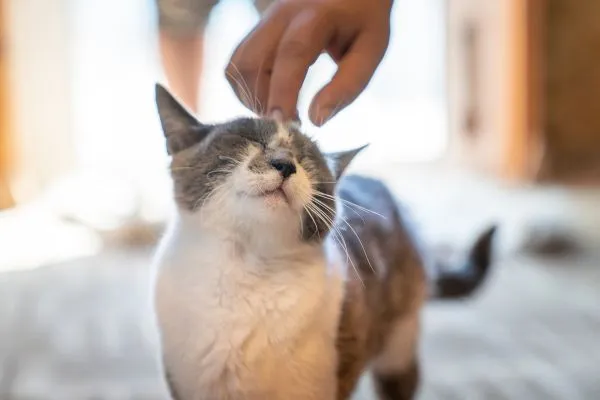It’s perhaps one of the most soothing sounds known to the human ear – the soft purr of a contented cat. But why is it that our feline friends purr, what does it tell us about their mood? And perhaps most intriguingly, how loud can this seemingly delicate sound truly be? (For the surprising answer, scroll down to watch the remarkable Guinness World Records attempt).
Elle Boden, Behaviour Officer at Cats Protection explains everything you need to know about purring.

Why do cats purr?
It is indeed true that cats who are relaxed may purr contentedly. But like many characteristics of cats, it’s not always that simple – as we’ll come to later.
Cats can purr for a variety of reasons, and by watching their accompanying body language, you can work out why. In general, if a cat appears calm, with small pupils in their eyes, ears forward and relaxed, and their tail is pointing up or curled around them, their purring is most likely a sign they’re happy.
If they’re purring while twirling around your legs or nuzzling up to you, chances are they’re after a bit of attention, so a gentle fuss may be in order.
Do cats purr to communicate?
Just as newborn humans are born with the ability to cry to communicate their needs, kittens are able to purr from birth. They use it to let their mum know where they are, if they’re hungry, and to develop that close bond which will keep them safe in the first few weeks of life.
Why do cats purr when you pet them?
Ever noticed how your cat begins to purr loudly when you’re stroking or playing with them? This type of purring kicks in when cats are particularly stimulated and may be accompanied by kneading, drooling and licking.
Why does my cat bite me while purring?
It’s absolutely fine to continue, but some cats can get to the point of overstimulation and might bite or scratch. If this happens, leave them alone to calm down and aim to finish playtime slightly sooner next time.
Can cats feel stressed when they purr?
Most dog owners will tell you their dog will bark when they’re happy, like when they’re enjoying an energetic game, and also when they’re feeling threatened, perhaps by a loud sound such as fireworks.
It’s the same with cats and purring – they do indeed purr when happy, but they’ll also purr when they’re feeling stressed. This is why it’s so important to watch accompanying body language – if your cat is purring while their ears are flat or turned to the side, their eyes are wide open and their whiskers are pointing forward, they may be feeling stressed.
It’s thought the low frequency vibrations caused by purring may promote bone and tissue growth, and reduce pain or swelling...
Cats are great at self-soothing: Just as cats may purr when they’re stressed, it can also mean they’re in pain. If you notice your cat is purring more than usual, it may be a sign something is wrong so it’s important to closely watch their behaviour, especially if they are hiding away more than usual, and contact your vet for advice.
One particularly fascinating theory is that cats may purr to sooth and heal themselves. It’s thought the low frequency vibrations caused by purring may promote bone and tissue growth, and reduce pain or swelling, although there is no clear evidence to confirm this.
Why do some cats not purr?
Purring is one of the most common behaviours seen in cats, but that doesn’t mean they all do it. All cats are unique and will have their own preferred way of communicating – whether it’s through meowing, chirruping, purring or simply using body language. The key is to know your cat – if they’ve never purred and have suddenly started, or if they used to purr and have abruptly stopped, it may be a sign they’re unhappy or unwell.
Is a purring cat good for humans too?
One of the top reasons for owning a cat is to help reduce stress, and purring may play its part in this. Many people report that low-frequency ambient noise helps them relax and sleep better, so your cat’s purring may well be helping you unwind. Why not have a bit of fun and record your cat purring for a unique mobile phone ringtone?
Can big cats purr?
Though they may have a mighty roar, big cats like tigers and lions are unable to purr. Only small cats like bobcats, lynxes, cheetahs and our own pet cats are able to purr. This is all down to a bone in the back of the throat called the hyoid. In small cats, this bone is rigid so when the voice box vibrates, the hyoid bone reverberates to generate purring. In big cats this hyoid bone is only partly rigid, meaning they can produce roars but not purr.
How loud can cats purr?
Thanks to a recent Guinness World Records attempt, we can answer that question. Tune in to discover the astonishing volume of Bella's purring that propelled her to the pinnacle.
Find out more feline facts
For more information about cat behaviour, visit Cats Protection, and check out our expert guides to a range of questions about cats, including how long do cats live?, how to stop cats scratching furniture and how to teach a cat tricks.